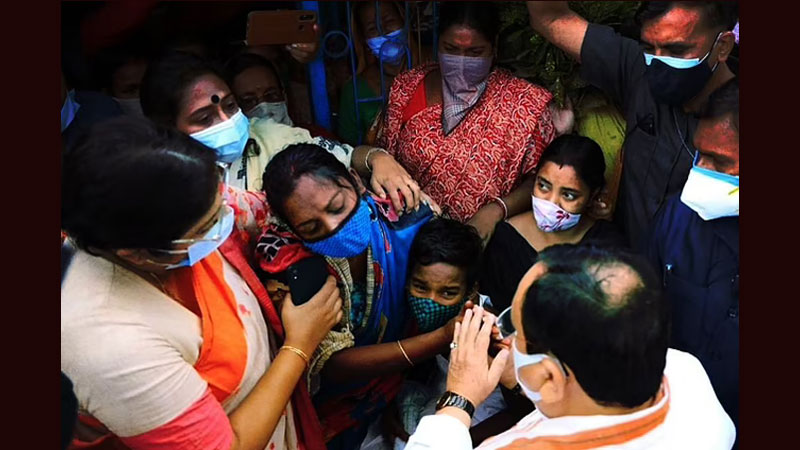The situation prevailing in West Bengal is a manifestation of “law of the ruler” and not “rule of law”, the NHRC panel probing post-poll violence in the state has said in a damning indictment of the Mamata Banerjee government, and recommended CBI investigation in cases of rape and murder.
The NHRC panel, constituted following an order by a five-judge bench of the Calcutta High Court, also said the cases of alleged rape and murder be tried outside the state. Business Standard in a news report said, “The committee has recommended that grievous offences like murder, rape, etc should be handed over to the CBI for investigation and these cases should be tried outside the state,” the report, submitted to the court in sealed covers on June 13”.
“The situation in the State of West Bengal is a manifestation of ‘Law of Ruler’ instead of ‘Rule of Law,” the report of the seven-member committee said, as it highlighted “appalling apathy” of the government towards the plight of victims.
After the report was submitted on 13 July the court had directed that its soft copies along with annexures be supplied to the counsel for the petitioners, the Election Commission, and the Additional Solicitor General of India.
A clutch of PILs filed before the court had alleged people were assaulted, forced to flee their homes and their properties destroyed in post-election violence.
A five-judge bench headed by Acting Chief Justice Rajesh Bindal had directed the NHRC chairman on June 18 to constitute a committee to examine all cases of alleged human rights violation during the violence that lasted several days.
“This was retributive violence by supporters of the ruling party against supporters of the main opposition party,” the NHRC panel said in the report.
“It is indeed ironical that, in the land of Rabindra Nath Tagore, ‘Where the mind is without fear and the head is held high; where the world has not been broken up into fragments by narrow domestic walls’; thousands of its citizens have been subjected to murder, rape, displacement and intimidation, etc. in the last couple of months,” it noted.
The report also spoke of government machinery being used to further the objectives of the party in power.
“This may well be death knell for democracy in this great nation. It is high time that the rot is stemmed and this trend is reversed in the interest of having a vibrant democracy in this nation,” the committee said in the strongly-worded 50-page report.
It warned that if the worrisome trend was not checked the “disease” may spread to other states also.
Maintaining that the acts of violence resulted in disruption of life and livelihood of thousands of people and their “economic strangulation”, the report said, “The local police has been grossly derelict, if not complicit, in this violence.”
Holding that violence and intimidation has continued, the report said that there is palpable “fear among victims against police and goons of ruling party.”
It said that many displaced persons have not yet been able to return to their homes and resume their normal life and livelihood.
“There have been several sexual offences but victims are scared to speak out. Loss of faith in state administration among victims is very evident,” the report noted.
The panel said neither senior officers nor political leaders condemned the violence, visited the spots, assuaged the victims or did anything substantive to ameliorate the problems.
“People were left on their own to protect the violation of their human and fundamental rights, including right to life, liberty, dignified living and health,” the committee said, as it held reponsible “a pernicious politico- bureaucratic-criminal nexus” for the violence.
The seven-member panel recommended constituting a committee headed by a retired judge to monitor the implementation of the orders of the high court. The committee should have independent officers as observers in each of the affected districts.
It suggested that barring the grievous cases like rape and murder, which should be handed over to the CBI, others be probed by a court-monitored SIT. The trials, it said, should be conducted in fast track courts and witnesses given adequate protection.
The recommendations included ex-gratia payment, compensation for damage to property, rehabilitation of the victims, protection to women, static pickets of central forces and action against delinquent government servants.
Several teams under the seven-member committee headed by Rajiv Jain visited 311 spots across the state in 20 days before compiling the report.
The panel received around 1,979 complaints about over 15,000 victims from various sources including the NHRC itself, West Bengal Legal Services Authority, WB Human Rights Commission, National Commission for Women and petitions filed in courts.
Highlights of NHRC Report
–The situation prevailing in West Bengal is a manifestation of “law of the ruler” and not “rule of law.
–NHRC panel probing post-poll violence in West Bengal has said in a damning indictment of the Mamata Banerjee government, and recommended CBI investigation in cases of rape and murder.
–The committee has recommended that grievous offences like murder, rape, etc. should be handed over to the CBI for investigation and these cases should be tried outside the state.
–This was retributive violence by supporters of the ruling party against supporters of the main opposition party.
–Thousands of citizens have been subjected to murder, rape, displacement and intimidation, etc. in the last couple of months.
–The report also spoke of government machinery being used to further the objectives of the party in power.
–The report said,“The local police has been grossly derelict,if not complicit in this violence”.
–There have been several sexual offences but victims are scared to speak out.
–It suggested that barring the grievous cases like rape and murder, which should be handed over to the CBI, others be probed by a court-monitored SIT.
–The recommendations included ex-gratia payment, compensation for damage to property, rehabilitation of the victims, protection to women, static pickets of central forces and action against delinquent government servants.


